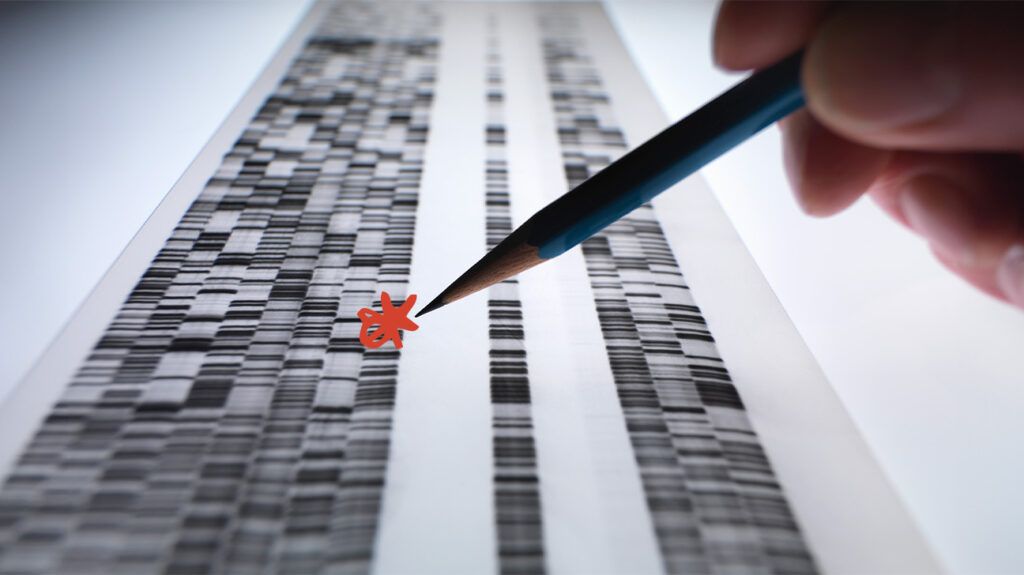A mutation in the KRAS gene can lead to uncontrollable cell growth and the development of cancer. Having this mutation can significantly influence the treatment and outlook of people with colon cancer.
The mutation in the KRAS gene is a vital genetic factor that can influence treatment for colon cancer. A doctor may screen for KRAS mutations at the diagnosis stage.
In this article, we examine the KRAS mutation in colon cancer, how doctors diagnose it, treatment options, and how to get support.

The KRAS gene, which stands for Kirsten rat sarcoma, is responsible for producing a protein that controls cell growth and division. When this gene undergoes mutation, it can lead to uncontrollable cell growth, contributing to the development and progression of cancer.
Colon cancer originates in the colon. It is sometimes known as colorectal cancer when an individual has cooccurring colon cancer and rectal cancer. Approximately
In colon cancer, gene mutations are particularly significant because people with
KRAS mutations are also prevalent in other cancer types, such as lung cancer and pancreatic cancer.
Diagnosing KRAS mutations involves genetic testing of tumor tissue. Oncologists may perform specialized tests, such as
The
Identifying KRAS mutations is crucial for determining the most appropriate treatment plan for a person with cancer.
Treating colon cancer with a KRAS mutation requires a different approach from treating cancers without this mutation. This is because it is resistant to certain treatments, such as EGFR inhibitors.
A doctor may recommend treatment options for those with cancer involving KRAS mutation, including:
- Chemotherapy: Chemotherapy remains a cornerstone of treatment for colon cancer, but the presence of a KRAS mutation can affect its effectiveness, and the response rates may vary.
- Surgery: For early stage colon cancer, a doctor may recommend surgery to remove the tumor. In cases where the cancer has spread, doctors might recommend surgery with other treatments.
- Clinical trials: Participation in clinical trials can provide access to new and potentially effective treatments that are not yet widely available. Patients with KRAS mutations may benefit from trials exploring new bespoke therapies suitable to their genetic makeup.
The outlook for patients with KRAS-mutant colon cancer varies depending on several factors, including:
- the stage of diagnosis
- a person’s overall health
- response to treatment
Generally, KRAS mutations have associations with more aggressive disease and
The 5-year relative survival rate for localized colon cancer is around
Relative survival rate
The relative survival rate suggests how long someone with a condition may live after their diagnosis compared to someone without the condition of the same race, sex, and age over a specific time. This is different from overall survival rate, which is a percentage of people still alive for a specific time after diagnosis of a condition.
It’s most important to remember that figures are estimates, and everyone is different. Talk with your doctor about your specific condition.
In
Having colon cancer, especially the KRAS-mutant type, can be challenging for people and their families. The process of receiving a diagnosis and subsequent treatment is often difficult for many.
Support systems play a crucial role in managing the emotional, physical, and financial burdens of the disease. Options include:
- Support groups: Joining support groups can provide a sense of community and shared experiences.
- Counseling services: Professional counseling can help address mental health concerns and improve coping strategies.
- Educational resources: Accessing reliable information about the disease, including treatment options and ongoing research, can empower people and their caregivers.
In this section, we answer some frequently asked questions about KRAS mutation in colon cancer.
What is the life expectancy of a KRAS mutation patient?
Life expectancy for a person with a KRAS mutation in colon cancer depends on several factors, including the stage at diagnosis, overall health, and response to treatment.
Generally, those with KRAS mutations have lower life expectancy than those without the mutation.
Does chemo work on KRAS mutations?
Chemotherapy can still be effective in treating KRAS-mutant colon cancer, but the response may vary. Standard chemotherapy treatment plans may need adjustments, and people might not respond well to certain targeted therapies, such as EGFR inhibitors.
What is the survival rate for colon cancer spread to the liver?
When colon cancer spreads to the liver, the 5-year survival rate drops significantly to about
KRAS mutations play a critical role in the progression and treatment of colon cancer. These mutations affect the effectiveness of certain therapies and have associations with a more aggressive form of the disease.
Early diagnosis, personalized treatment plans, and comprehensive support systems are essential for managing KRAS-mutant colon cancer. Despite the challenges, ongoing research and clinical trials offer hope for improved outcomes and new treatment possibilities for people with KRAS-mutant colon cancer.
